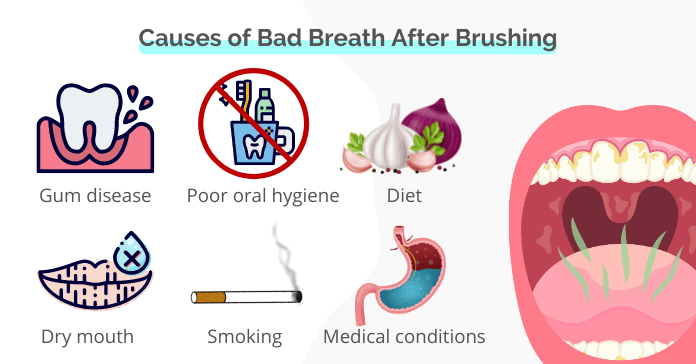Bad breath is an embarrassing and uncomfortable issue that can make social situations unpleasant. It can be caused by a variety of factors, including poor oral hygiene, certain medical conditions, or even the foods we eat. Sometimes, bad breath may persist despite regular brushing and flossing. While bad breath may not seem like a serious problem on its own, it can be a sign of an underlying dental or health problem. In this blog post, we will explore some of the potential causes of bad breath after brushing, as well as easy steps you can take to reduce or eliminate it completely.
Causes of Bad Breath Even After Brushing
Bad breath, also known as halitosis, is mostly caused by sulfur-producing bacteria that live in the mouth. These bacteria break down proteins and food particles, producing volatile sulfur compounds (VSCs), which give off an unpleasant smell.
Poor oral hygiene is one of the most common causes of bad breath. Without proper brushing and flossing, food particles and bacteria can accumulate in the mouth, creating a sticky film on teeth known as plaque. The presence of plaque on your teeth can create a breeding ground for bacteria that cause bad breath.
Good oral hygiene, including brushing and flossing, can help reduce bad breath by removing the plaque and bacteria from your teeth. However, brushing your teeth may not always be sufficient to eliminate bad breath.
Let’s explore some possible reasons why bad breath may persist despite brushing your teeth.
Oral Causes
When plaque accumulates on your teeth, it can cause inflammation and infection in your gums, leading to periodontal (gum) disease. If left untreated, periodontal disease can cause pockets to form between your teeth and gums where bacteria can accumulate. Bacteria buildup may contribute to bad breath even after brushing your teeth.
Other dental problems such as cavities or tooth decay, broken fillings, dental abscesses, dry mouth, tongue coating, and ill-fitting dentures can also lead to persistent bad breath even after brushing.
Medical Causes
In some cases, bad breath may be the result of a medical condition, such as sinus infections, gastroesophageal reflux (GERD), diabetes, bronchitis, kidney failure, and liver failure.
In addition, certain medications, such as those used to treat depression and high blood pressure, can cause dry mouth, which can lead to bad breath.
Diet Causes
Your diet also plays a role in causing bad breath. Foods with strong odors, like garlic and onions, contain substances called sulfur compounds that are released into your bloodstream after digestion and then expelled through your lungs when you breathe. This can cause bad breath even after brushing your teeth.
Sugary foods can also contribute to bad breath by feeding the bacteria in your mouth, leading to an increase in VSCs (volatile sulfur compounds).
Postnasal drip
Postnasal drip can lead to bad breath even after brushing. Postnasal drip occurs when mucus accumulates in the back of your throat due to allergies or a cold, allowing bacteria to grow, which can cause bad breath.
Smoking
Smoking is another major cause of bad breath. Smoking causes the tissues in your mouth to become dry, which can contribute to bad breath. It also contributes to a buildup of plaque and tartar on your teeth, leading to persistent bad breath even after brushing.

Home Remedies for Bad Breath That Lingers After Brushing
If you have bad breath, some simple home remedies may help. Brushing your teeth and tongue twice daily with fluoride toothpaste can help remove bacteria and food particles that can cause bad breath.
In addition, flossing daily and using an antibacterial mouthwash can help reduce the amount of bacteria in your mouth, leading to fresher breath.
Drinking plenty of water can also help keep your mouth hydrated and reduce the likelihood of bad breath. Chewing sugar-free gum may also help by stimulating saliva production, which helps keep your mouth clean and fresh.
Finally, cutting back on or avoiding foods with strong odors, like garlic and onions, can help reduce bad breath.
What to Do If I Have Bad Breath After Brushing?
If the simple home remedies mentioned above don’t help reduce bad breath, it’s best to visit your dentist or doctor for an examination. They can check for any underlying medical conditions and may be able to prescribe medications or recommend lifestyle changes that could help reduce bad breath.
The treatment depends on the underlying cause. If bad breath is caused by oral issues, such as gum disease or cavity, your dentist may recommend:
- Scaling and root planing to remove plaque and tartar (hardened plaque)
- Tooth fillings to treat cavities or replace old fillings
- Root canal treatment to treat abscessed teeth
- Prophylaxis cleaning every six months to keep plaque and tartar at bay
- In extreme cases, gum surgery, such as osseous surgery, may be required to correct gum disease.
Bad Breath After Brushing – Conclusion
Bad breath after brushing can be caused by several factors, including poor oral hygiene, dry mouth, and certain medical conditions.
Simple home remedies such as drinking plenty of water, using an antibacterial mouthwash, and brushing and flossing twice daily with fluoride toothpaste can help reduce bad breath.
If these steps do not provide relief, it’s best to visit your dentist or doctor for an examination and appropriate treatment. With the right treatment, bad breath can be eliminated for good.